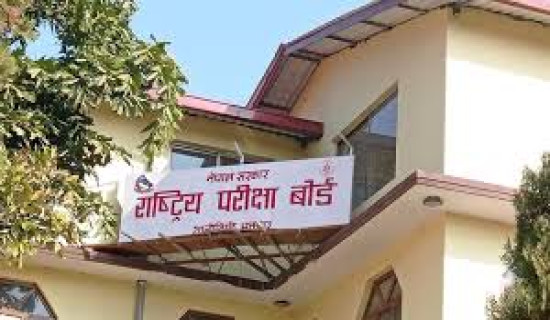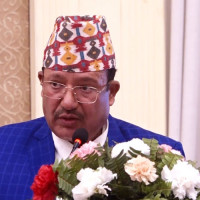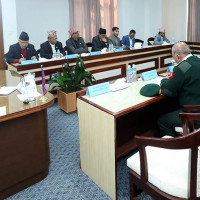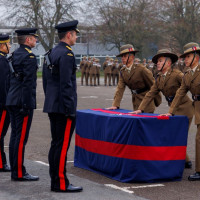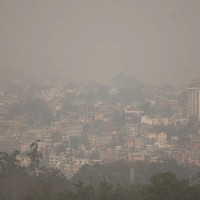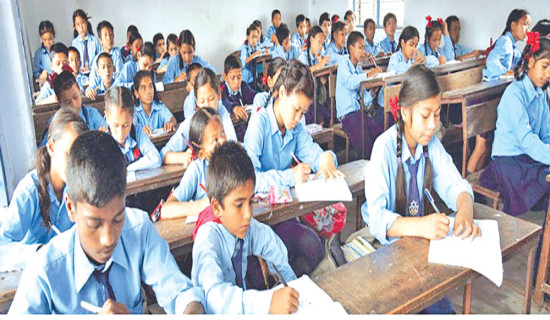- Wednesday, 18 February 2026
Transitional justice process making progress
Kathmandu, July 10: A glimmer of hope has pervaded among stakeholders that the transitional justice process will reach its conclusion soon. The Ministry of Law, Justice and Parliamentary Affairs started undertaking its works afresh to resolve the problems as it has successfully convinced the stakeholders to give up their rigid stance and to come to a mid-point to have a win-win situation.
It has already been 16 years since the signing of the Comprehensive Peace Accord (CPA) between the then government and CPN (Maoist). The remaining work of the process has become a thorn in the flesh of the government, political parties and the stakeholders.
During the insurgency that took place from 1996-2006, thousands of people were killed, forcefully disappeared, injured and displaced.
The CPA initiated the beginning of a transitional justice process, in which it was agreed that the perpetrators of abuse would be punished, victims vindicated, and society would be taken toward the path of progress through a stable democracy. But, the authorities failed to work on achieving these goals for a long because both victims and perpetrators denied accepting the process till now.
Why the delay?
As the CPA stipulated to resolve the issues of TJ through the establishment of commissions, two commissions - The truth and Reconciliation Commission and the Commission of Investigation on Enforced Disappearance were formed by the government in 2014, eight years after the CPA. However, victims and stakeholders objected to the appointment of commissioners.
They moved Supreme Court demanding that victims’ involvement should be ensured in the whole justice delivery process. As a result, the commissions couldn’t work in full swing despite taking complaints from victims. According to the record of the government, Truth and Reconciliation Commission received 64,000 complaints and Disappearance Commission received about 3000 cases.
Likewise, it was reported that the then armed police force and Maoist combatants were involved in most of the atrocities during the insurgency. Now, many of them are in different political and professional positions. They also stated that atrocities had happened for political purposes; therefore, facing punishment like one has committed criminal offences is not acceptable to them.
Similarly, bypassing the commissions some victims filed individual cases in different courts including the Supreme Court. These courts also gave verdicts on the cases declaring their criminal offences. But, the administration was unable to enforce the verdicts following protests from political players.
Because of this, the two commissions could only receive complaints from victims but failed to take testimony as many cases were filed against senior leaders, including Pushpa Kamal Dahal, Baburam Bhattarai, and Sher Bahadur Deuba, blaming that all atrocities had taken place under their order.
What is the government doing now?
After the TJ process failed to reach its logical conclusion for long, the government has now appointed Govinda Prasad Sharma Koirala as the Law Minister. Now, the Minister has undertaken exercises to convince politicians, victims and civil society to come to a middle ground for resolving all issues related to the TJ.
Under the process, the Ministry has completed the consultation with victims and stakeholders in all seven provinces and at the national level with a plan to amend the Commission for Investigation, Verification, and Reconciliation of Disappeared Persons Act, 2071.
The government has discussed the matters to lure perpetrators to accept the reconciliation. Though the government has also proposed an open jail for symbolic punishment even for serious crimes, the victims rejected such a proposal. They said they would accept only if the perpetrators would get punishment based on their crime as per the
consent of the victims. They demanded different independent bodies to declare the punishment for insurgency-time crimes.
Minister Koirala told the victims that his main purpose of being the Minister was to settle the TJ issue. Therefore, he urged the victims to support him to resolve the issues, he said.
He said that the transitional justice process will have a safe landing soon as the government had received support from political parties, global communities, civil society, victims and other stakeholders.
“Now the government has been drafting the amendment bill as per the verdict of the SC and suggestions were given by the stakeholders. The draft of the bill will be tabled at the parliament by mid-July for approval.” He expressed his hope that the amended bill will be passed during the current session of the parliament. “We will push for that,” Minister Koirala said.
Likewise, the government has been working to make two commissions more credible that can be acceptable to all stakeholders.
Ganesh Datta Bhatta, the chairperson of the Truth and Reconciliation Commission, said the commission was undertaking a hell lot of work during its tenure despite limitations in the current act. Out of 63,794 complaints received by the commission, the commission has completed a preliminary investigation into 4,000 cases. The commission has kept 3,000 cases pending.
The commission has issued the conflict victim’s identity cards in 600 cases and that is already recommended to the government. Now, for the last five months, both commissions have become jobless owing to stay order from the SC.
Despite the limitations of the resources, the commission made a praiseworthy achievement in a short period. Bhatta stressed that only one central office could not complete the investigation of the 64,000 cases. He asked the government to expand offices in 18 different places including seven provinces.
Bhatta said that the work of TJ would conclude in the next three to four years if the commission could function without any disturbance. Though Bhatta applauded the government initiatives to amend the bill as it was required, he expressed dissatisfaction over not involving the commissions in making consultations with stakeholders in all provinces and at the national level. Besides, the term of the commissioners is going to expire by mid-July this year.
Differences among stakeholders on the provision of punishment have been seen, but there are not many differences on the issue of reparation. Victims have demanded assurance of health, education and employment along with recognition of their beloved’s contribution to the nation’s political changes, the government has also agreed to address their demand.
Victims’ opinion
Victims are stating that they have a sense of belonging toward the government this time as the Minister himself is well-informed about and an authority on major cases of insurgency-time crimes and victims’ sensitivity.
During national consultation, held last week, victims said amnesty to perpetrators of atrocities was not acceptable in serious crimes that include rapes, disappearances, killing after taking victims captive, and bodily harm with an intention to kill the victims.
Earlier, some cases of serious crime were filed at different courts and the courts delivered verdicts on the criminal offences. However, these verdicts could not be implemented as perpetrators and political parties rejected them.
Because of this, victims are also convinced that the war-time crime must be resolved through a different mechanism with the consent of the victims. They demanded representation of the victims in the recommendation committee formed to recommend commissioners of those two commissions.
Suman Adhikari of Lamjung, a leader representing the victims’ side, said that this time victims have a hope that the transitional justice issues will settle soon as a serious initiative has been taken by the government. He said the government would be successful only if they amended the act as per the recommendation of the victims’ society. Adhikari, however, said the government has not yet made clear the modality of its structure and human resources as it has to look after thousands of cases. If it does not make it clear, the process will fail again.
What civil society says
Civil society and lawyers, who are working in the sector of transitional justice, have also expressed their satisfaction with the latest development of the TJ process.
Issuing a statement, the Accountability Watch Committee last week stated that despite some shortcomings, the development of the latest consultations has raised some hopes of creating a climate of trust among stakeholders and bringing the transitional justice process back on track.
Raju Prasad Chapagain of the committee said that the committee demanded with the government to make the process of bill amendment transparent, consultative and credible by utilizing the positive energy created among the stakeholders.
All this evidence shows that the transitional justice process has come back on track. To make it successful, more initiatives from the government and positive support from political parties, victims, Nepal Army and civil society are required.
If the process reaches its logical conclusion, thousands of families who are still waiting for the truth about their beloved ones will get information about the lost ones and perpetrators will feel relieved after bearing the punishment of their crime. People rendered helpless because of bloody insurgency will get a new way of life, bringing harmony to society.



